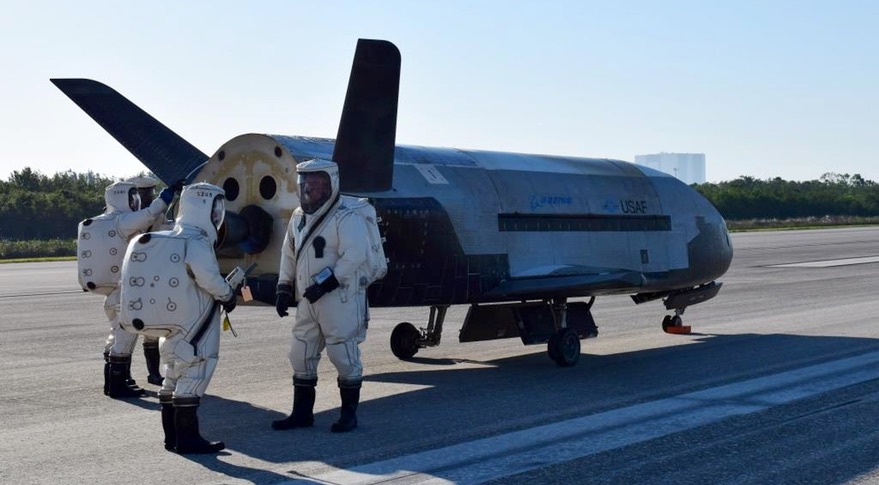7.06.2017
SpaceX wins launch of U.S. Air Force X-37B space plane
Elon Musk's Space Exploration Technologies Corp will fly its first mission for the U.S. Air Force in August when it launches the military's X-37B miniature spaceplane, Air Force Secretary Heather Wilson said on Tuesday.
Four previous X-37B missions were launched by United LaunchAlliance Atlas 5 rockets. ULA is a joint venture of Lockheed Martin Corp (LMT.N) and Boeing Co (BA.N).
"SpaceX will be sending the next Air Force payload up into space in August," Wilson said during webcast testimony before the U.S. Senate Armed Services Committee. She later specified that the payload would be one of the Air Force's two X-37Bspaceplanes.
Launch contracts are usually announced about two years before a flight but the Air Force did not disclose the X-37B contract until Tuesday, a mere two months before the flight. The Air Force declined to say when the contract was awarded or provide other details.
SpaceX President Gwynne Shotwell declined to comment.
SpaceX's first publicly disclosed launch contract for the Air Force was awarded last year for a next-generation Global Positioning System satellite flight in 2018. A second GPS launch contract was awarded in March. The contracts are valued at $83million and $96.5 million, respectively.
In May 2016, the U.S. National Reconnaissance Office disclosed it had hired SpaceX to launch a spy satellite aboard a Falcon 9. The mission, which was arranged through an intermediary, Ball Aerospace, took place last month.
SpaceX is owned and operated by technology entrepreneur Musk, who is also chief executive of electric car maker Tesla Inc (TSLA.O).
Quelle: Reuters
+++
SpaceX will launch next secret X-37 Air Force mission

SAN ANTONIO, Texas — The Air Force is preparing to launch its secret X-37B spaceplane aboard a SpaceX Falcon 9 rocket later this year, the service said June 6.
It will be the first time Elon Musk’s company will carry the X-37 into orbit, and is possibly the biggest national security launch SpaceX has been responsible for to date.
The X-37 “will be going up again on top of a SpaceX launcher in August,” Secretary of the Air Force Heather Wilson said at a hearing of the Senate Armed Services Committee, showing members a small model of the spaceplane.
This will be the fifth launch of the X-37 Orbital Test Vehicle. Wilson didn’t disclose why the Air Force selected SpaceX over United Launch Alliance, who launched the first four X-37B missions aboard Atlas 5 rockets. However, she emphasized in her testimony the growing capabilities of the commercial space industry in general.
“There’s some very exciting things happening in commercial space that bring the opportunity for assured access to space at a very competitive price,” Wilson said.
Randy Walden, director of the Air Force Rapid Capabilities Office, said in a press release that “the ability to launch the Orbital Test Vehicle on multiple platforms will ensure a robust launch capability for our experiment designers. We are excited about this new partnership on creating flexible and responsive launch options and are confident in SpaceX’s ability to provide safe and assured access to space for the X-37B program.”
The X-37 vehicle returned from its fourth mission May 7, landing at the Kennedy Space Center after 718 days in orbit.
There are actually two Boeing-built X-37 spacecraft. The Air Force has not indicated which X-37 craft will be launching aboard the SpaceX rocket. However, the fact that the service has been alternating missions between the two craft, and that the second X-37 was the one that landed in May, means that it’s likely the first X-37 is due up for the next mission.
The Air Force said it intends to continue building “upon its fourth mission collaboration with experiment partners. The mission will carry the Air Force Research Laboratory (AFRL) Advanced Structurally Embedded Thermal Spreader (ASETS-11) to test experimental electronics and oscillating heat pipes in the long duration space environment.”
The X-37 is a secret Air Force program, with the first space plane launching on April 22, 2010 and spending roughly 224 days in orbit. The Air Force said that all together, the four missions have spent a total of 2,085 days in space.
Quelle: SN
